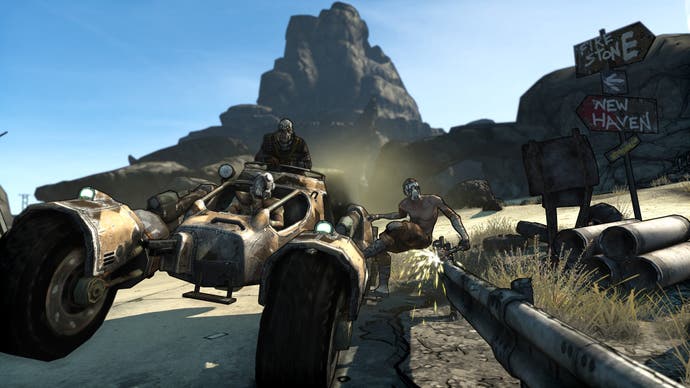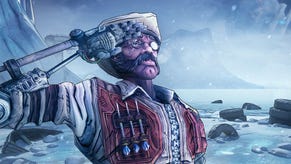E3: Borderlands
Madder Max.
At the end of our E3 Borderlands preview, Gearbox's Randy Pitchford, who's been talking for the last 20 minutes at an insane rate of knots without, apparently, ever needing to take a breath, asks if anyone has a question. Someone does, as it happens, right down at the front of the group. It's Cliff Bleszinski. And he wants to know what engine the game's using.
It's free advertising for Unreal Engine 3, of course, but it's also a folksy and rather surreal moment - an ideal conclusion for an overview of a game that's magnificently deranged, and more than a little homespun itself. Borderlands is a strange beast, however you consider it: a faux MMO, and a cel-shaded hillbilly sci-fi nut farm all rolled into one. Or, as Pitchford explains things: "A shooter, but a real deep RPG too." Actually, we prefer our way of phrasing it.
The idea is simple: Borderlands takes place on the distant planet of Pandora, a lawless dustbowl populated by nasty wildlife and crazy, long-forgotten colonists. On this grim world, a race is underway, with gaggles of competing treasure hunters fighting to be the first to enter the Vault, a mysterious room carved into the side of a mountain, which is rumoured to contain alien technological wonders and untold riches. The problem is, everybody who goes in tends to die, and nobody's quite sure where it is in the first place.
Our demo is completely chaotic - not because the game is crashing or misbehaving, but because that's just how Borderlands rolls, its focus pinwheeling between manic firefights with mutant colonists, unexpected attacks from the local beasties, and headlong scrambles to pick up the loot that's scattered across the ground after every period of breezy slaughter.

After a few minutes, Pitchford stops trying to explain the game in any meaningful way, and instead drops into the role of an enthusiastic sports reporter: "Ooh, spider-ants! Real deadly! Aim for the glowing weak spot behind them! Ouch!" Later, once we get into a car - battered futuristic tech that could have come straight from the cover of slightly dubious eighties sci-fi pulp - he stops completely for a rare minute or so, as the only meaningful commentary he could be offering would be speculation as to which gnarly life-form we were in the process of driving over.
Part of this insanity is because of the procedural generation that lies at the centre of the game-world: Borderlands boasts, for example, well over 500,000 weapon permutations resulting in an ongoing procession of bizarre firearms - some mutations merely aesthetic, others creating exotic strains of ballistics even the developer hasn't seen before. These arrive in the loot drops, while chunks of the huge environment and much of the ecology seems to be just as haphazard.
In the case of the guns at least, the shortcomings of such a system are obvious - it may be hard to feel that anything you find is really special in a game that chucks such freakish toys at you, and you're unlikely to gain much of an attachment to your equipment in a world where something even weirder will be coming your way in a matter of minutes. But it's also a charmingly eclectic way of doing business, favouring mindless experimentation and allowing for wacky shootouts in which you spin the ammo cylinder on your grenade-launching pistol and take on enemies armed with electrically-charged shotguns.







